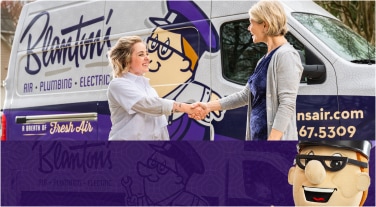0% No Interest Financing for 6 Months*
Delivering Trusted Service Since 1951
Back to Blog
4 Variables That Impact Your Water Heater Cost You Want To Know Before Buying

Happy Customers Choose...
Hot water heater cost differs greatly depending on a few key variables. Get the facts so you don’t pay more than you need to.
Replacing your hot water heater? Congratulations! Here at Blanton’s, we live for this stuff. As you begin researching, you’ll likely immediately notice that water heater cost runs the gamut. Unless you’re a professional plumber, it’s hard to tell what’s “worth” the money, and what’s a bad deal. The fact of the matter is that there are a variety of factors that will impact your water heater cost. You’ll want to understand all of them before making the purchase. Here are the most important variables in choosing a new water heater, so you get the best deal (and don’t pay for something you don’t need).
Water Heater Cost Variables
Replacing or updating your water heater is a big deal that often brings with it a big price tag. If you need help navigating the options, contact your local plumber. They’ll help you determine what you like and dislike about your current situation, so you can decide what to choose next.
Tankless Or Storage Tank Water Heater?
The first order of business is determining whether you want a tankless water heater or a conventional storage tank water heater. Which type of water heater do you currently have? If your home is old, or you have never replaced the water heater, it is likely that you have a conventional storage tank model. These hold a large amount of water that is kept hot, so it’s ready whenever you need it. The benefit of a conventional storage tank model is that hot water is always available, and it doesn’t quickly run out. These typically cost less up front, but are not energy efficient because they’re constantly using energy to keep the water hot… even if you’re not using it, or are not at home. This can translate into a larger monthly energy bill.
On the other hand, a tankless water heater does not store water in a holding tank, but rather heats water as it is needed. These are energy-efficient and will cost more upfront, but can reduce your monthly costs. Depending on size and model type, tankless water heaters may not always be a good choice for large families or people who use multiple hot water sources at once (such as a dishwasher, washing machine, and shower).
Size And Capacity Of Water Heater?
Of course, you’ll also be paying for the size and capacity of your water heater. When dealing with conventional storage tank water heaters, 40-50 gallons is industry standard, and likely sufficient for a family of four. There are multiple other options, however. 30-gallon models cost less, and may be more than enough if you live alone or with just another person. You may feel that you need more than 50 gallons (say, 60-80) if your family uses a lot of water, or if you have a hot tub.
When it comes to tankless water heaters, you’ll be paying for the flow rate, measured in gallons-per-minute. The greater the GPM number, the more expensive your water heater will be (generally speaking). If you go tankless and your home is large, you may also find that you need multiple units. This will, of course, affect the overall cost.
Gas Or Electric Energy Source For Your Water Heater?
You’re partially at the mercy of your home’s current energy source for this variable. If your home runs exclusively on electricity, you’ll need to invest in natural gas sourcing, which will be a costly initial investment. That said, there’s no “right” energy source, as both electric and gas have pros and cons.
Generally speaking, electric water heaters will cost you more over time — they also can’t be used in the case of a power outage. But they require less maintenance and have lower upfront and installation costs. Gas-powered water heaters are less costly in the long term and typically heat water faster than electric, but they carry a higher initial price point.
Energy Efficiency Of Water Heater?
New water heaters are more energy efficient than ever. But as with all appliances, there are models with an extra eye toward eco-friendly features. The ENERGYSTAR rating applies to water heaters with high efficiency, and can be easily researched here: https://www.energystar.gov/products/water_heaters. You can also call your local plumber and ask for their picks — here at Blanton’s we’re partial to Rinnai and Bradford White energy efficient water heaters.
All home improvement projects are worth researching before action is taken. Replacing your water heater is no exception. Because water heater cost varies so widely, you should be armed with all of the relevant information about what’s available and your household’s current needs and future goals. Now that is a hot tip!
Contact Blanton’s Air at (919) 298-2105 for all your Fayetteville or Raleigh, NC HVAC and plumbing needs.
Recent Posts
Make Blanton’s Your First Call!
Get Your service with a Wow!
Our Extraordinary Service Plan features maintenance, Service, & Support for Your Home
- Biannual HVAC tune-up and inspection
- Annual water heater inspection
- Annual electrical safety inspection
- No extra charge for Saturday service
- All repairs backed by a one-year warranty
- Exclusive members-only savings
- Priority service and dedicated support line
Learn More






